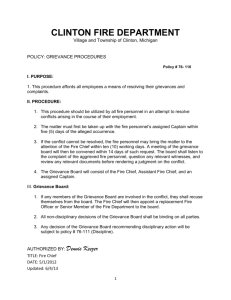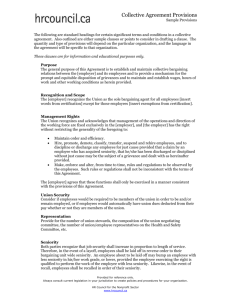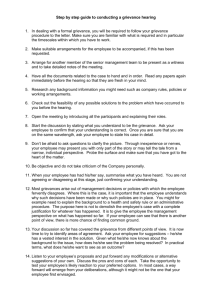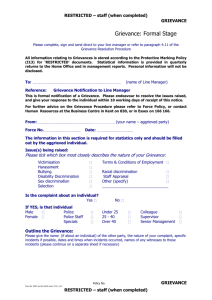Powerpoint - Queen's University
advertisement
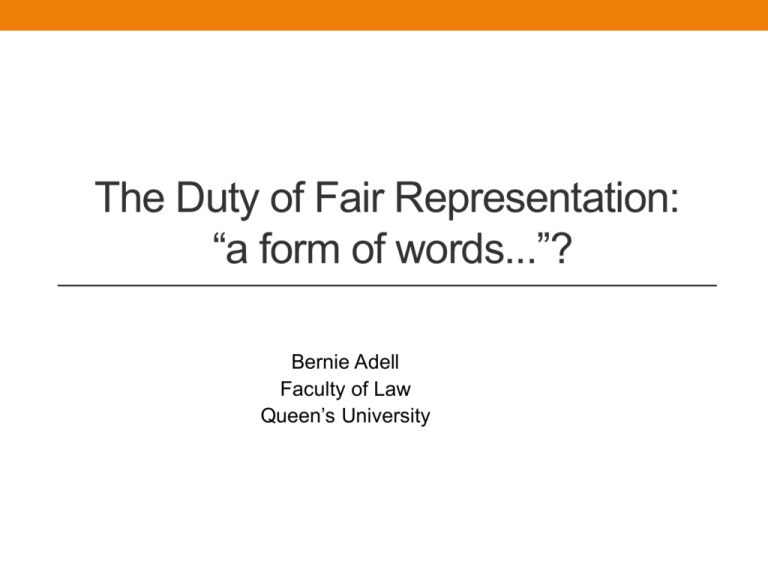
The Duty of Fair Representation: “a form of words...”? Bernie Adell Faculty of Law Queen’s University “[T]he duty of fair representation . . . is almost without exception a form of words which holds the promise to the ear and breaks it to the heart. Even its advocates doubt its efficacy.” • Clyde Summers, 1962 Lots of DFR complaints • “We’re no longer the Ontario Labour Relations Board – we’ve become the Ontario Duty of Fair Representation and Construction Industry Grievance Board.” • A search of the CanLII OLRB database on the terms "DFR and discrimination" since 2001 turned up about 300 cases • In only 8 was the complaint upheld, either partially or completely. • None of the 8 involved discrimination on a ground prohibited in the HR Code. Jack Kroner -1967 • “It is curious how easily the liberal conscience, once having identified the interest of the trade union with that of the individual worker in terms of his struggle against the employer, is unable to part with the viewpoint when the individual stakes out his claim against the institution itself.” -Jack L. Kroner, “The Individual Employee – His ‘Rights’ in Arbitration after Vaca vs. Sipes,” in T.G. Christensen (ed.), NYU 20th Ann. Conf. on Labor (Albany, NY: Bender), 1967, 75 at 88. Kroner 1967 • Kroner on the practical refusal to consider the merits of an employee’s grievance in a DFR proceeding: …”while immunizing the parties from the rank-and-file grievant, it opens the door wide to the political opposition, the lavatory lawyer, the minority unionist, and the crank. … [T]he crank can have a field day . . .” - Kroner, p. 82. Laskin 1963 Bora Laskin, “Collective Bargaining and Individual Rights” (1963) 6 Can. Bar J. 278: • “I would ... assert that employees should be limited to the machinery of dispute adjustment set up by the collective agreement where they assert claims comprehended by the agreement. But fundamental to this assertion is the proposition that the dispute machinery must be open to full utilization by the employee who chooses to process his claims by his own unaided efforts. ...” (p 291) • “The justification for permitting individual processing is not merely to strike a blow for individualism; it is to guard against possibly unfiar representation or discriminatory or negligent representation, or even denial of representation, of an employee’s interests by his bargaining agent. . . . Rather than let the matter rest on some right of the employee to compel the Union to take up his case – which may even turn out to be frivolous – it is better to meet the issue squarely by permitting the employee to have the same right as the Union has to invoke the grievance procedure, but without necessarily excluding the Union from participation.” (p. 287) The antithesis of “direct access” • A long time ago (in 1970, and again in 1986), I suggested that DFR • • • • proceedings “have the inherent flaw of pitting employee against union, in what is often a bitter internecine fight, before even getting to the main event: the employee’s claim against the employer.” I then asked (a rhetorical question): “Is it necessary to make a prolonged, three-sided donnybrook out of a controversy which might well yield quickly to a one-step, bipartite hearing on the merits between employee and employer?” (11 QLJ 251 at 254) In today’s terms, the DFR is the antithesis of direct access. By definition, the DFR relates to a dispute between an employee and an employer – but it shunts that dispute off to a proceeding between the employee and the union (a proceeding where the employer also often feels obliged to participate). And it’s very unlikely that the matter will ever get back onto the main track. My prescription, back in 1986 • Re DFR in grievance processing: “The duty of fair representation cannot bear the load which it is expected to bear in the grievance processing area, and reform is required to give individual employees the right to carry their own grievances to arbitration without going through a duty of fair representation proceeding.” • Re DFR in collective bargaining: “In contrast, a different sort of balance between collective and individual rights is called for in the negotiation of collective agreements. Our existing law in that area correctly gives individual employees very limited rights to challenge provisions agreed to at the bargaining table.” The union veto • It’s not really the DFR that I object to. Our labour boards have • • • • generally done the best they can with it. What I do object to is the union veto on access to arbitration. That veto doesn’t exist anywhere in the industrialized world outside of the US and Canada. Labour courts and labour tribunals almost everywhere are equally accessible to all employees, whether with or without union support. As far as I know, the closest analogue to our system is in Sweden, where an employee who complains that the employer has violated his or her collective agreement rights can’t go to the Labour Court unless he has union support, but can go to the other courts. Why do we need the union veto in Canada, when other labour law systems that are just as protective of collective employee rights have long been able to do without it? More specifically, on the topic of this workshop -• Does the DFR hold the union to a higher standard of representation where the employee alleges that the employer discriminated on a prohibited ground? • Beginning with a Saskatchewan case in 1997, a few DFR cases required unions to be more proactive than usual in handling grievances alleging prohibited-ground discrimination, especially for workers with disabilities. • But by 2002, when I last wrote on the DFR, (in the Labour Arbitration Yearbook), a few other cases had indicated a move back to what Kroner called the institutional mindset. Current state of the substance of the DFR in discrimination cases: the Bingley bunch In more recent years, a few cases – mainly in the CIRB – have taken up the “extra measure of care and assertiveness” idea: • Grace Bingley 2004 CIRB 291 at para 83: “The case law leaves little doubt that to discharge their duty of fair representation, unions are required to take an extra measure of care and show an extra measure of assertiveness when representing a member who is alleging a violation of statutory anti-discrimination rights. Thus to the extent that the union demonstrates that it was reasonably careful and reasonably assertive, labour relations boards will not likely worry about whether the union’s decision not to pursue a grievance is correct on the language of the collective agreement, or even on the language of the applicable human rights statute.” • Barbara Pepper 2009 CIRB 453 at para 38 : “…when a grievance involves an accommodation issue, the union is expected to be proactive and more attentive in its approach (see Grace Bingley).” What has changed since 2002? It’s now considerably clearer than it was in 2002 that grievance arbitration has extensive (and usually final) authority over antidiscrimination rights, as well as many other employee statutory rights: • - Parry Sound 2003 • - Tranchemontagne 2006 -- "Since Tranchemontagne, tribunals other than human rights commissions have rightly assumed that, absent legislative intent to the contrary, they have concurrent jurisdiction to apply human rights legislation." – Abella J. in Figliola, para 21 • - Figliola 2011 • - More experience with statutory downloading of other employee rights enforcement to grievance arbitration: e.g., Ont. ESA. • - In the other direction -- Morin (2004) pushes DFR-in-negotiations disputes involving HR issues into the HR forum, which may be why we see so few DFR-in-negotiations cases today. Interface between DFR and HRTO • Morin (SCC 2004) is the key case – the two-tier case that Elizabeth Shilton has written about (too unsympathetically, in my view). • McLachlin CJ made what I think is the very valid point that in contrast to Parry Sound, the unions in Morin were opposed in interest to the complainants and therefore not in a good position to press their grievances. • That point may help to explain why there have been so few DFR-in-negotiations complaints in the decades since the use of the human rights forum really took off. Where a complainant alleges that a collective agreement itself discriminates on a prohibited ground, the HR forum is a better place to go because there is no union veto. Elizabeth Shilton on Morin In “Choice, but No Choice” (forthcoming), Elizabeth Shilton says: • In Morin, the union “was an active party to the alleged discrimination. The position of the negotiating parties that an arbitrator had exclusive jurisdiction over the dispute was opportunistic; since they controlled access to an arbitrator, there was no realistic prospect that the dispute would ever reach an arbitrator through normal grievance channels. It is not surprising that the majority of the court saw a vacuum here that only an HRT could fill. The problem for subsequent decision-makers attempting to apply this factor is the court’s failure to articulate a clear distinction between human rights complaints that will not get to arbitration because the union is an active party to the alleged discrimination and cannot challenge it in good faith, and those that will not get to arbitration simply because the union, carrying out its normal grievance screening functions, decides not to send them there. This line needs to be drawn more intelligibly.” • In my view, that is too vague and risky a line to draw. • A conflict of interest is a conflict of interest is a conflict of interest. Example of OLRB recognition of conflict of interest • Harris 2009 CanLII 33987 (OLRB) – Union and employer negotiated a collective provision that privileged ability over seniority. Then, in a job competition where the junior candidate was clearly more able, the union told him it wouldn’t let him enforce the clause as written – that seniority was sacrosanct. The union brought a grievance for the senior employee, and got her the job. • DFR claim was then brought by the junior employee, on the basis of arbitrariness (no HR violation was alleged). • The OLRB (correctly, in my view) held the union’s disregard of the clear wording of the agreement to be a breach of the DFR. Multiple forums after Figliola • In Figliola, Abella J focuses on the public interest in avoiding relitigation. Letting individual employees have direct access to arbitration would in my view be an effective way of doing just that. RElitigation is a bad thing, but an employee should have one shot at “litigation”. • Paterno 2011 HRTO 2298: the applicant had asked the grievance arbitrator to decide only his complaint that the employer had no cause for discipline, and not to decide his complaint of sex and disability discrimination under HR Code. However, at the employer’s insistence, the arbitrator decided both complaints, and rejected the discrimination complaint. • Applicant then went to HRTO. Assoc. Chair Wright said (para 3): “The applicant’s submissions amount to the suggestion that the applicant has an absolute right to litigate the lawfulness of a discharge in two different proceedings, even though an arbitrator has full jurisdiction to apply the Code and award Code remedies. I do not agree.” • That makes sense. Since Parry Sound, arbitrators clearly apply HR statutes as of right - so if an arbitrator has dismissed a grievance an a HR claim, it should be dead. But an applicant ought to have an “absolute right” to litigate a grievance in one proceeding. The individual “has a choice...” • The HRTO will dismiss a complaint if the allegation of prohibited-ground discrimination set out in the complaint has been dealt with in arbitration (Melville 2012 HRTO 22). • Or in a DFR proceeding (Dunn 2008 HRTO 149, Cunningham 2011 HRTO 658). • In Melville, at para 8, Assoc. Chair Wright says: “an individual working under a collective agreement has a choice – he or she can choose not to file or proceed with a grievance and to pursue the application at the Tribunal instead.” • But in addition to alleging discrimination on HR-prohibited grounds, many grievances also allege discrimination on other grounds (such as simple favoritism) , as well as other nondiscriminatory violations of the collective agreement. The individual “has a choice...” (cont’d) • If the union refuses to press such a grievance (or if the employee perceives that the union is in a conflict of interest), the employee’s only “choice” is to go to the OHRT. But the OHRT will (quite properly) look only at the HR issues. If the non-HR complaints are strong but the HR complaints are weak, the OHRT option is by no means a viable “choice” for the employee. • I suppose the employee could then go to the OLRB with a DFR complaint about how the union handled the non-HR issues. If the complaint was upheld, the OLRB could send the matter to arbitration. • But wouldn’t it be simpler all around to let the employee take the matter to arbitration himself or herself? • There would indeed be significant process questions about how such a matter should be arbitrated, and what safeguards there should be against abuse. I can’t go into those questions here, but there are many possible ways of dealing with them.

